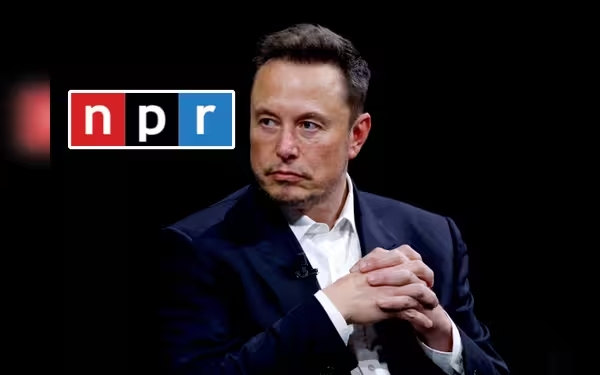Saturday, November 16, 2024 10:53 PM
Elon Musk Advocates Defunding NPR Over CEO's Controversial Remarks
- Elon Musk calls for NPR defunding after CEO's video.
- Debate over public funding and media bias intensifies.
- Supporters argue NPR provides essential news coverage.
 Image Credits: tribune.com.pk
Image Credits: tribune.com.pkElon Musk's call to defund NPR sparks debate on media funding and bias following a controversial video of the network's CEO.
Billionaire Elon Musk has ignited a significant discussion regarding the funding of National Public Radio (NPR) after sharing a controversial video clip featuring NPR CEO Katherine Maher. This incident has raised eyebrows and sparked debates about the role of public funding in media organizations, particularly those perceived to have political biases.
The video clip, which Musk shared on social media, shows Maher discussing NPR's editorial choices and its approach to news coverage. Critics of NPR have long argued that the network exhibits a liberal bias, leading to questions about whether taxpayer money should support such an organization. Musk's call to defund NPR has resonated with many who believe that public funds should not be allocated to media outlets that they perceive as politically skewed.
Supporters of NPR, on the other hand, argue that the network provides valuable news coverage and educational programming that serves the public interest. They contend that defunding NPR would limit access to diverse viewpoints and diminish the quality of journalism available to the public. This ongoing debate highlights the complexities surrounding public funding for media and the challenges of maintaining impartiality in news reporting.
As discussions continue, it is essential for the public to consider the implications of defunding NPR and similar organizations. While it is crucial to hold media accountable for their reporting, it is equally important to ensure that a variety of voices and perspectives are represented in the media landscape. The conversation surrounding NPR's funding is not just about one organization; it reflects broader concerns about media integrity, public trust, and the role of government in supporting journalism.
The call to defund NPR by Elon Musk has opened a Pandora's box of discussions about media funding and bias. As citizens, it is our responsibility to engage in these conversations thoughtfully, weighing the importance of diverse media representation against the need for accountability in journalism. Ultimately, the future of public media may depend on how we navigate these complex issues.













